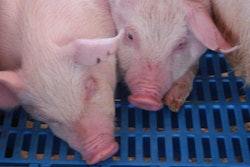
Several regulatory issues will affect feed mill managers throughout the remainder of 2019, according to Paul Davis, director of quality, animal food safety and education for the American Feed Industry Association (AFIA). Davis spoke Tuesday at the USPOULTRY Feed Mill Management Seminar in Nashville, Tennessee.
Those five issues are ingredient approvals; the government shutdown; Congress, policy and trade; the farm bill and African swine fever.
1. Ingredient approvals
Davis said the approval process for new ingredients is slow: He cited a survey that found that $1.75 million in revenue is lost for every year of approval delay. For ingredients to be approved, a food additive petition must be filed, the ingredient must be generally recognized as safe, and it must appear in the American Association of Feed Control Officials official publication.
2. Government shutdown
Although the U.S. government partial shutdown ended in January, it continues to have effects. For example, Davis said, there will be fewer Food and Drug Administration inspections of feed mills this year.
3. Congress, policy and trade
The new U.S. Congress, which convened in early January, has a renewed focus on climate change, immigration reform, health care and administration oversight, Davis said. In the Senate, Sen. Pat Roberts (R-Kansas), chair of the Senate agriculture committee, has said he will not seek re-election in 2020. In Washington, legislators are also focused on the U.S.-Mexico-Canada Agreement, the ongoing trade dispute with China, and new free trade discussions with Japan, the European Union and the United Kingdom.
4. Farm bill
Of interest to feed manufacturers in the new farm bill is the classification of horses as livestock, as opposed to pets, as they were classified in a previous version of the bill. The new farm bill also funds a foot-and-mouth disease vaccine bank, and allows funding for research.
5. African swine fever
African swine fever (ASF), which continues to spread across Asia and Europe, would negatively affect the U.S. pork industry by $8 billion if it enters the country, Davis said. Feed mill managers should be concerned about ASF for several reasons, Davis said:
- It could lead to ingredient supply interruption.
- It could cause a panic by consumers, affecting animal protein consumption.
- It could increase shipping and hold times.
- If a country or ingredient is banned, can that ban easily be removed?
- Biosecurity can prevent spread of the disease.
View our continuing coverage of the African swine fever outbreak.
















